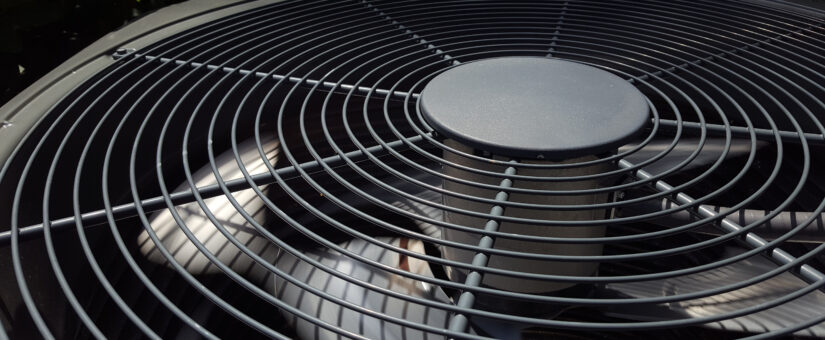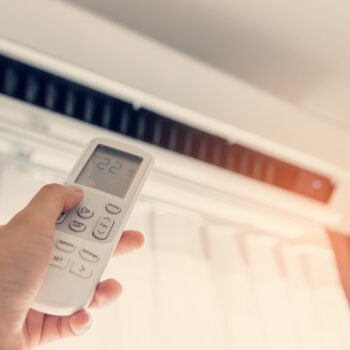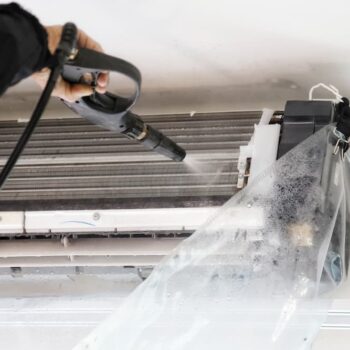
- On November 2, 2021
Another Job for Howard Air & Plumbing
A hot Arizona day is hardly the right time to look outside and see your Phoenix home’s air conditioner fan not spinning. Inside, as your house slowly broils, you wonder what you should do. Many of our customers (seriously) figure they should somehow hit the unit to “loosen it up” and get the fan spinning. They go outside full of good intentions and a hammer. Once near the unit, they see the air conditioner fan not spinning but humming instead. This usually makes them retreat and call in professionals.
When your A/C fan doesn’t spin, that’s a sure sign that something’s wrong. It only takes a few hours of your air conditioner outside fan not running for your home to get uncomfortable on the hottest days here in the Phoenix area. People get concerned in most parts of the country when they notice the A/C fan isn’t working outside because they’re worried about the house getting too humid. That might not be as much of a problem if you live in a dry part of Arizona, but it’s still worth learning about the possible causes of an A/C unit not spinning.
How Does Your A/C Work?
To understand why your outside A/C fan isn’t working, first, you have to understand a little bit more about the unit. Your air conditioner actually has two fans: one inside the home and one outside of the home. The fan inside of your home blows cool air into the vents so it can be dispersed throughout all of your rooms. The fan on the outside of your home blows warmth out of your home. Both of these fans have to be working for your air conditioner to function effectively.
How Do I Know if My Outside A/C Fan Isn’t Working?
This is one of the easiest air conditioner problems to diagnose. All you have to do is walk outside your home and stand near your outdoor A/C unit. If you don’t hear humming while you approach the unit, your fan probably isn’t spinning. You can also peer at the top of the unit to see if the fan is spinning. Of course, you also need to make sure your unit is on and that the fan should be spinning.
A/C Condenser Fan Not Spinning
If you discover that the fan is not working in your outdoor A/C unit, this could mean that you have one of the following problems:
- The capacitor might have a problem if the compressor is humming, but the fan doesn’t turn.
- It’s also possible that the motor itself is broken if the unit is humming, but the fan doesn’t turn.
- If the fan isn’t spinning and there is no sound coming from the compressor to indicate it’s doing anything, there is either a problem with the power or the compressor contactor.
A/C Compressor Works But A/C Fan Not Working Outside
If you can hear the compressor working, but the fan still isn’t turning, you might be left wondering where the disconnect is. It’s possible that the motor or capacitor could have failed or that there could be a problem with the capacitor. The capacitor’s job is to provide the burst of energy that gets the fan motor running. If either the capacitor or the fan motor fails, the fan won’t be able to start turning.
There are a few things you can look into as you try to get to the bottom of this issue. It’s important to mention, though, that you should always be extremely careful when you inspect electrical appliances like this. If you become uncomfortable or uncertain at any point, your best bet is to call an expert who can work with your air conditioner safely.
Make sure your system is off before you try any of the following:
- Open the side of your outdoor A/C unit and see if there’s any debris wrapped around the fan axle. If there is, carefully remove it without damaging any of the components.
- Look to see if there’s a buildup of sludge on your motor’s bearings. If so, you might need to clean the motor bearings. Only attempt this if you know what you’re doing and if your system is off because otherwise, you could hurt yourself or damage your equipment.
- Check to see if the belt is broken or loose. If it is, it won’t get traction on the fan and make it spin. This might not apply to modern units, however, as many of them are now built without fan belts. If this is the problem, you’ll have to decide if you want to get an A/C fan belt replacement or simply upgrade to an entirely new air conditioner.
If you look for the signs above and still can’t determine exactly what the problem is, just leave your system off and call a professional. Even if you have a guess about what the problem is, it’s far better to call an HVAC contractor than it is to attempt something by yourself, especially when you’re not completely confident in your ability to correct the issue.
It’s especially important to make sure you don’t try to inspect the capacitor or terminals by yourself unless you have the proper training and equipment to do so safely. The capacitor stores energy, which means it can shock you even if your air conditioner is turned off. Not to overstate it, but as a general rule, you really shouldn’t ever stick your hands into a piece of machinery like this unless you know exactly what you’re doing.
Look but Don’t Touch
Instead, the most useful thing you can do in this situation is inspect the problem visually. That way, you can provide some helpful information when you schedule your service appointment, which helps the HVAC company get your system up and running again as quickly as possible.
Here’s how you can perform the visual inspection:
- First, go to your breaker box and turn off the electricity to your outside A/C unit.
- Next, open the service panel on your outside A/C unit and look for the capacitor (without reaching anything inside the unit). The capacitor is either round or cylindrical, and it has two or three prongs on top.
- While you do this, avoid touching anything, especially the capacitor, terminals, or any fluids that have leaked out.
See if your capacitor is rusted, swelling, or leaking.
Trouble Ticket
Many an air conditioner repair company in Arizona turns over a trouble ticket to technicians that simply reads, “Fan not spinning on air conditioner.” The cause of the problem could indeed be a stuck bearing, so one good smack in the right spot could temporarily free the motor. Usually the problem is more involved.
Do It Yourself?
Anytime a homeowner wants to treat an ailing central air conditioner, we at Howard Air & Plumbing encourage you to consider how much a repair mistake could cost you.
If you insist on poking and prodding, triple-check that power to the outside unit is turned off. Most central air conditioners have circuit breakers immediately next to exterior units, plus panel circuit breakers for the entire system. Turn both off! Only if you feel comfortable should you proceed further.
Gravity Assist
Debris can fall down on your condenser/compressor unit, wrap itself around the fan hub and cause it to stop. It need not be something big enough to physically block the blades; a slim vine or plant shoot could do it.
With power off, remove the protective panels from your condenser and visually inspect the fan. Remove any debris, give the fan a manual spin and see if anything is interfering with its movement.
Fan Club
The condenser fan motor could be burned out. The system is still trying to start it (large capacitors are in play here so use extra caution) and so the system hums yet the fan does not turn. Enlist professional help to replace the condenser fan motor.
Bearing Down
Bad bearings could cause the fan to seize. The bearings allow the fan axle to turn. The fan hub is attached to the axle; if the bearings on the motor have seized, the unit will hum loudly but the fan will not move. You can attempt to inject electric motor oil (lubricating oil specifically designed for electric motors) into the ports of the motor, then try to restart the system.
Schedule an Appointment Today!
You can avoid expensive mistakes by contacting Howard Air & Plumbing for professional, prompt service. Whether your fan is not spinning or you have some other problem, we are ready to help you.
If you see signs of trouble, you know the capacitor is the problem. If you still can’t tell what the issue is (or if you don’t want to go through all of that trouble just to make a service call anyway), the best thing is to call for help right away. Book your appointment with Howard Air & Plumbing, and we’ll get your home cool again as soon as possible!
Featured Image: Rana X/Shutterstock


















0 Comments